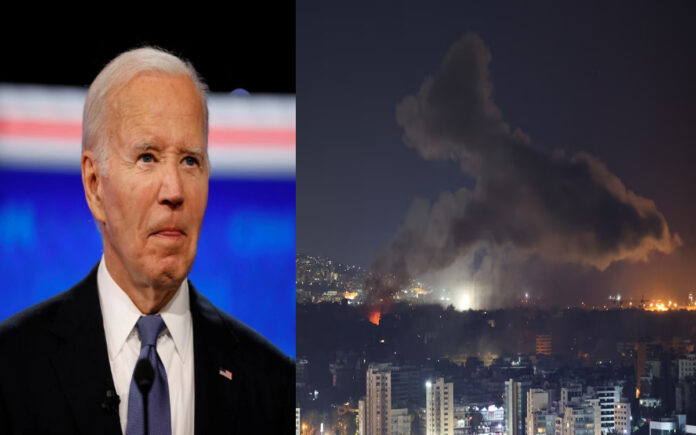Washington: U.S. President Joe Biden expressed his belief that an “all-out war” in the Middle East is unlikely, despite escalating tensions between Israel and Hezbollah. Speaking on Thursday, Biden acknowledged that more work needs to be done to prevent a larger conflict as Israel weighs its options in response to the largest assault by Tehran in recent history.
When asked about the likelihood of averting a full-scale war, Biden replied, “How confident are you it’s not going to rain? Look, I don’t believe there is going to be an all-out war. I think we can avoid it. But there is a lot to do yet, a lot to do yet.”
The U.S. president’s comments followed Israeli airstrikes on Beirut, targeting Hezbollah positions, as the conflict between Israel and Lebanon continues to intensify.
Ongoing U.S.-Israel Discussions
While the U.S., European Union, and other allies have called for a 21-day ceasefire, Biden stated that the U.S. is discussing possible responses with Israel. This includes options for retaliation after Iran’s attack on Israeli oil facilities. “We’re discussing that,” Biden said, contributing to a surge in global oil prices and heightening concerns over potential disruptions in oil supplies.
Biden further emphasized, “There is nothing going to happen today,” but he refused to comment publicly on whether he was discouraging Israel from targeting Iran’s oil infrastructure. Earlier, Biden stated that he would not support an Israeli strike on Iran’s nuclear sites.
Also Read | IDF Eliminates Key Hezbollah Leader Mahmoud Anisi, Explosions Reported Near Beirut Airport
Hezbollah-Israel Conflict Escalates
Meanwhile, Hezbollah launched 230 rockets from Lebanon into Israel on Thursday, with the armed group claiming to target Israel’s “Sakhnin base” in Haifa Bay and “Nesher base” with Fadi 2 rockets. Israel, in response, conducted renewed air raids on Hezbollah positions in Beirut, with one raid reportedly targeting Hezbollah official Hashem Safieddine. His status remains unclear, according to Axios journalist Barak Ravid.
Israel’s military has not commented on Safieddine’s fate, but Hezbollah has claimed it killed 17 Israeli troops in southern Lebanon on Thursday. Israel has yet to confirm these reports.
Also Read | Israel Targets Hezbollah’s Hashem Safieddine, Nasrallah’s Likely Successor
G7 Calls for Restraint
As tensions escalate, the Group of Seven (G7) nations, which includes the U.S. and the U.K., condemned Iran’s missile attack on Israel and reiterated their support for Israel’s security. At the same time, the G7 urged both sides to exercise restraint, warning that the cycle of attacks could spiral into a broader regional conflict.
“The dangerous cycle of attacks and retaliation risks uncontrollable escalation, which is in no one’s interest,” the G7 statement read.
Lebanon Caught in the Crossfire
Lebanon continues to face significant casualties, with the country’s health ministry reporting that 27 people were killed and 151 wounded on Thursday alone. More than 1.2 million Lebanese have been displaced since Israeli strikes on Hezbollah began, with nearly 2,000 people dead, mostly in the last two weeks, according to Lebanese authorities.
The U.S. House of Representatives Foreign Affairs Committee has called on Biden to expedite weapons shipments to Israel, including 2,000-pound bombs, which are considered crucial in Israel’s fight against Hamas and Hezbollah’s extensive underground bunkers and tunnels.



